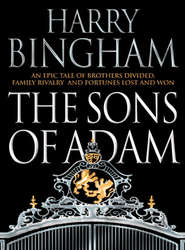скачать книгу бесплатно
That evening, as he and Mitch Norgaard passed a wood on their way home, they broke from the column of prisoners and ran for their lives into the sheltering trees. Some shots rang out. Still they ran.
Norgaard was hit once in the leg. He could have stopped. Tom would have stopped there with him. But the thought of further captivity was too much for the noble-hearted American. ‘Freedom!’ he shouted. ‘Freedom!’ He ran on and Tom ran with him.
Into disaster.
As appalling luck would have it, a group of German guards on their way home from camp was passing through the woods. Tom and Norgaard ran almost into them. A shot cracked out. Norgaard was hit again and fell dead. The rifles swung around to Tom.
He thought seriously about running on. He thought about choosing death by gunfire over death by starvation. He thought about it, but decided against. He raised his hands, and – wearily, wearily – plodded towards the guns.
This was the success: that Mitch Norgaard would never know captivity again.
Here was the failure: that Tom would, as likely as not, never know anything else.
Tom’s punishment was lenient: one month in solitary confinement on half-rations. When, at the end of the month, he was brought before the camp commandant, his legs were thin, his arms scrawny, his belly jammed tight with hunger. He had lived almost a year in prison. He supposed he would die there.
The commandant frowned.
‘No punishments. Satisfactory work record. Not so sick as many. Why try to escape? You were lucky not to be shot.’ The commandant spoke German, a little quicker than Tom could easily understand.
‘Lucky? Why lucky?’ said Tom. He was dizzy from long confinement, lack of daylight, and the delirium of near-starvation. The German word for stomach shoved its way into his mind. ‘Magen. Mein Magen.’
The commandant snorted, then turned to one of the Wachposten at his side in order to issue a series of rapid instructions. Then, using French, he spoke to Tom. ‘I have changed your work detail. We need more help on the farms. You will be ready at five o’clock, to be on the farm by six thirty. You will give me your word of honour that you will not attempt to escape again. Understand?’
Tom understood – and on that day Tom’s war ended, or at least the brutal uncertainty over living or dying.
As the commandant had known, it was easy for any man working on a farm to keep himself alive. If Tom sowed barley, he ate a handful of the grain. When he split turnips for the sheep, he kept a moon-shaped slice for himself. When he carried the tubs of porridge to the pigs and calves, he slurped up some of the mixture from the bottom, where the oats were thickest. In autumn, at harvest time, he chomped on fresh apples, concealed some of the waxy potatoes in his tunic, had a pocket of wheat bulging in his trousers.
For the first time since being taken prisoner, Tom remembered what it was like to be happy.
To be happy and to survive.
47 (#ulink_bf171dea-4c54-5a53-adc5-76c542ecf887)
Alan too survived the war.
When his health returned, he went back to France. But not to the front line. Not to the fighting. With a rare flickering of intelligence, the War Office had the sense to transfer Alan to an outfit known as the Military Fuels Procurement Office in Paris.
Alan had had very little idea of what was involved until he got there and met his superior, a cheerful lieutenant colonel with a quick smile and a booming laugh.
‘Secret of success,’ said the lieutenant colonel. ‘Fritz thought he was going to win this war because his railways were better. We know we’re going to win, because our motor transport is better. Our lads came to France with just eighty vehicles to call their own. By the end of next year, we’ll have two hundred thousand, between us and the Frogs. That’s not to mention hundreds of tanks, thousands of aircraft, plus whatever the Yanks bring with ’em. But you know the best part about it all? It’s this. There’s no point Fritz trying to build lorries to keep up with us, because he’s got no oil to put in ’em. That’s our job here. Getting the fuel to the boys who need it. If we get it right, we’ll win the war.’
Вы ознакомились с фрагментом книги.
Для бесплатного чтения открыта только часть текста.
Приобретайте полный текст книги у нашего партнера:
